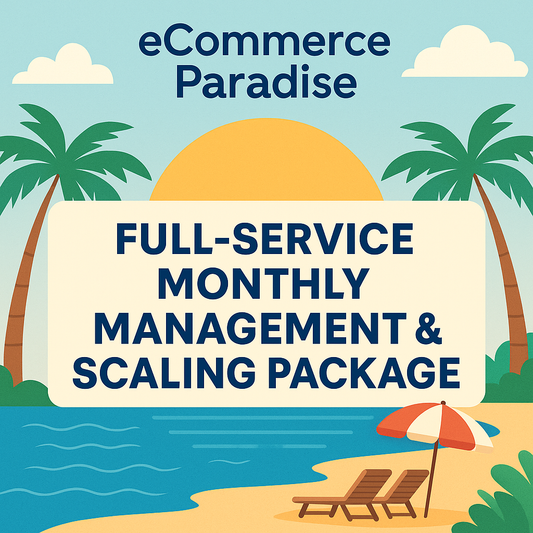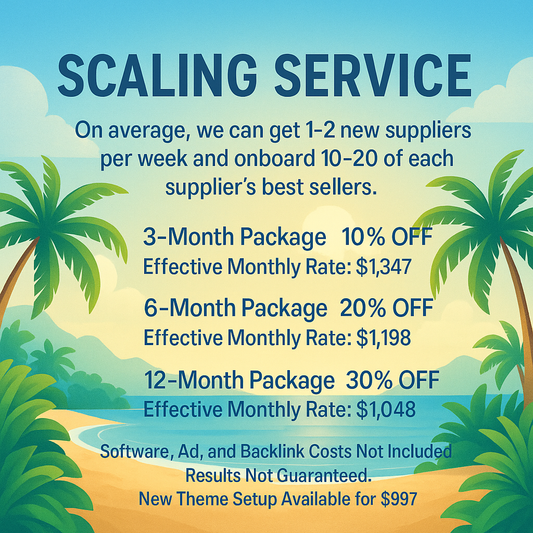
Building a Sustainable SEO Strategy for Lasting Growth
Welcome to Ecommerce Paradise, where we believe that an effective SEO strategy is key to achieving long-term growth for your online business. In the fast-paced world of ecommerce, having a sustainable SEO plan in place can set you apart from the competition, increase visibility, and drive more sales. Today, we’re diving deep into the essentials of building an SEO strategy tailored to your unique needs. Let’s get started!
Understanding the Basics of SEO
Search Engine Optimization (SEO) is the practice of enhancing your website's visibility on search engines like Google. When potential customers search for products you offer, you want your store to appear high up on the list of results. This is important because the higher your site ranks, the more likely people are to click on it. Let’s break down the primary components of SEO:
Keyword Research
The foundation of any successful SEO strategy is thorough keyword research. Understanding which keywords your target audience is searching for will guide the content you create. It’s important to identify not just the high-traffic keywords but also long-tail keywords that are relevant to your niche. Long-tail keywords often have less competition and can yield higher conversion rates.
On-Page Optimization
On-page SEO refers to the various optimization techniques you can apply directly to your web pages. This includes:
- Title Tags: Use clear, keyword-rich titles that accurately represent the content of each page.
- Meta Descriptions: Write enticing meta descriptions that encourage clicks from search results.
- Header Tags: Organize content using header tags (H1, H2, H3) for better readability and SEO performance.
- Image Alt Text: Always include descriptive alt text for images to boost accessibility and SEO.
The Role of Content in Your SEO Strategy
Content is the lifeblood of SEO. High-quality, relevant content can establish your authority in the ecommerce space and help you rank better in search engines. Here are some key points to keep in mind:
Creating Valuable Content
To attract and engage your audience, create content that addresses their needs and interests. This could be in the form of blog articles, product descriptions, or how-to guides. Always aim to answer common questions within your niche. This not only improves user experience but also encourages people to share your content.
Utilizing Blogging for SEO
Launching a blog on your Shopify site is a fantastic way to boost your Ecommerce SEO. Regularly publish informative posts that can cover a range of topics significant to your audience. Here are a few ideas:
- Tips for successful dropshipping
- Effective email marketing strategies
- The latest trends in Google Shopping Ads
Link Building Strategies
Link building is crucial for improving your site's authority and ranking. The more reputable websites link to your content, the more credible you become in the eyes of search engines. Here are some strategies to foster quality backlinks:
Guest Blogging
Reach out to other bloggers or ecommerce experts and propose guest posts. This not only gets your name out there but also can establish valuable backlinks to your site. Make sure to contribute high-quality, relevant content to ensure that you’re providing value to the host site.
Building Relationships with Influencers
Networking with influencers in your niche can be a great way to drive more traffic to your site. Collaborating on content or promotions can lead to backlinks and bring new audiences to your brand.
Leverage Google Shopping Ads
If you're operating an ecommerce store, utilizing Google Shopping Ads can significantly complement your SEO strategy. With proper optimization, your products can appear in the search results, boosting visibility and driving targeted traffic.
Optimizing Your Product Listings
Ensure your product titles and descriptions are keyword-rich and compel users to click. High-quality images and accurate pricing also play a role in conversion rates. Always keep your inventory updated to avoid disappointing potential customers.
Email Marketing and Its SEO Benefits
Email marketing not only helps keep your audience engaged, but it can also support your SEO efforts. By promoting your content and products through emails, you can drive traffic back to your site. This, in turn, signals to search engines that your website is relevant and valued.
Personalized Email Campaigns
Creating personalized email marketing campaigns can lead to improved engagement rates. Segment your audience based on their interests and previous behaviors to tailor content tailored to their needs. This can enhance user experience and lead to conversions.
Monitoring SEO Performance
Once your SEO strategy is in place, it's essential to monitor its performance continuously. This will allow you to make data-driven decisions and improve your tactics over time. Here are some metrics to track:
- Traffic: Look at both organic and referral traffic.
- Conversion Rates: Analyze how many visitors are completing desired actions on your site.
- Keyword Rankings: Regularly check how well your keywords are performing.
Utilizing Analytics Tools
Google Analytics is a powerful tool for tracking the performance of your SEO efforts. Use it to understand your audience better and refine your strategies accordingly. You can also consider using tools like SEMrush or Ahrefs for more detailed SEO insights.
Staying Up-to-Date with SEO Trends
The world of SEO is constantly evolving. Keeping up with the latest updates and changes in algorithms can help you maintain your presence in search rankings. Follow reputable blogs, podcasts, and online courses focused on SEO to ensure you are in the know.
Adapting to Changes
Changes in search engine algorithms can drastically impact your rankings. Being adaptable and ready to tweak your strategy accordingly can make all the difference in maintaining your ecommerce visibility.
Final Thoughts on Building Your SEO Strategy
Creating a sustainable SEO strategy isn't a sprint; it's a journey. By combining strong keyword research, valuable content creation, expert link building, and an understanding of how tools like Google Shopping Ads, Email Marketing, and ongoing analysis work together, you'll position your ecommerce business for enduring success. Remember, in the ecommerce space, patience and persistence are key to capitalizing on your efforts. So roll up your sleeves, dive into these practices, and watch your online store start to flourish!


















